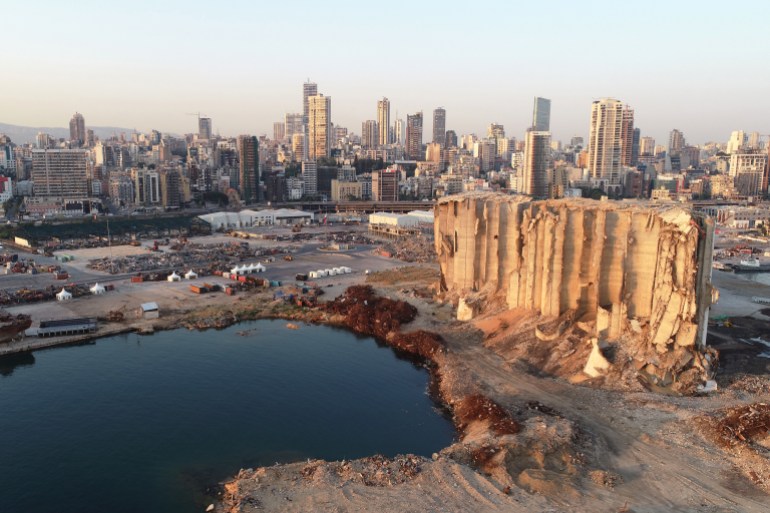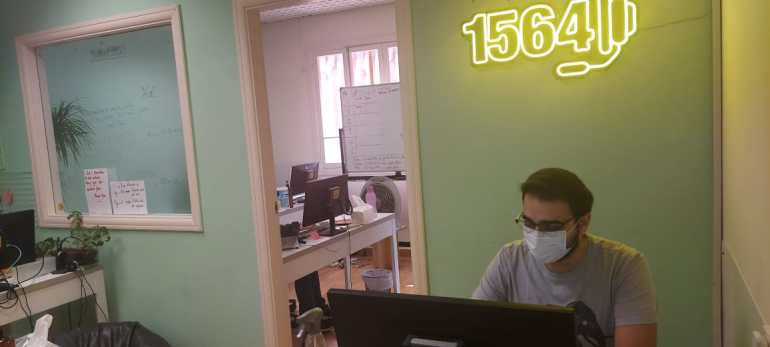‘Nothing but a pot of mlukhiye’: Trauma, mental health in Lebanon
Beirut, Lebanon – It was a hot September day when Jinane set out to find an international money transfer office near her home in east Beirut’s Ain el Remmaneh neighbourhood.
Jinane, 32, had already visited at least four offices, but none was in service because of chronic power outages that have plagued Lebanon for months.
The weekend was approaching, and the young translator had run out of cash. With only a few lira left in her purse, she was getting agitated about being unable to receive a transfer for an editing job she had recently completed.
Since the collapse of Lebanon’s banking sector in 2019, many people depend on international currency transfer offices, such as Western Union, to receive money from abroad.
By doing so, they avoid banks’ exorbitant transfer fees and circumvent a confusing maze of exchange rates for the local currency as the gap between the official and black-market rates to the dollar continues to fluctuate.
The Lebanese pound lost more than 90 percent of its value against the US dollar on the black market in two years, reaching more than 20,000 Lebanese pounds to the dollar over the summer. Yet, the central bank, Banque du Liban, maintains a rate introduced in 1997, which pegs the pound to the dollar at 1,500.
As Jinane directed her cab driver to an office near Jnah in south Beirut, a dark-haired man sitting behind the wheel of a nearby car was honking incessantly.
All the roads were blocked as cars queued for half a kilometre (0.3 miles) at a petrol station up ahead. Because of severe fuel shortages in Lebanon, people have been forced to wait for hours at gas stations to fill their tanks.
As the driver honked, Jinane became visibly distressed by the noise. She turned in her seat to gesture through the taxi window. “Why are you beeping? Can’t you see the roads are blocked,” she shouted.
But the dark-haired man carried on tooting and then he started getting aggressive, spewing curses at Jinane.
Within moments, she had disembarked the taxi and was standing in the middle of the road screaming back.
What began as a quarrel quickly escalated into a serious confrontation.
When the man eventually sped off in his expensive car, Jinane was left fuming as she edged closer to having a panic attack.
Loud noises
Hours later, Jinane calmed down. She sat down to recount the incident.
“Since the blast, I can’t stand to hear loud noises,” she said referring to the devastating events of August 4, 2020 – the day one of the largest non-nuclear explosions in history hit the city.
The detonation of nearly 3,000 tonnes of ammonium nitrate at Beirut’s port killed more than 200 people, injured 6,000 others, and ravaged entire neighbourhoods.
When the explosion hit at 6:08pm (03:08 GMT) local time, Jinane was in her kitchen making “mlukhiye” – a garlicky Middle Eastern dish made of jute leaf and chicken – for dinner.
“Before I knew it, I was on the floor, my windows and doors shattered,” said Jinane. “Then everyone ran out onto the streets. People were bleeding, screaming, and hysterical.
“But most of all, I remember the sound of the sirens from car alarms and the beeping,” she said slowly, as she lifted her hands to her ears and dropped her head between them.
“So much beeping,” she repeated slowly. She scrunched her eyes shut as if she were in pain.
Then, as if a light bulb had switched on in her head, she realised why she had reacted so strongly earlier that day. The beeping was a trigger, taking her back to the traumatic experience of the blast.
On that ominous day, Jinane found a ride to the northern city of Tripoli, where her family resides. Before getting in the car, she returned to her flat, giving it a final glance.
“Had we gone into war with Israel? Did the world end?” she asked. “I had no idea what was happening or if I’d ever come back.”
But she did not take anything. “Not family photos, not money,” said Jinane. “Nothing.”
“Just that pot of mlukhiye,” she said, recalling how she carried it in her lap as the car drove 80km (35 miles) north of the capital.
A local investigation into the blast has so far failed to identify the culprits behind the devastating explosion or yield significant arrests. Survivors and victims’ relatives have repeatedly demanded an independent probe to hold those responsible accountable.
 A family member of a victim of last year’s Beirut port blast carries a picture during a protest demanding justice, near the Justice Palace in Beirut [File: Mohamed Azakir/Reuters]
A family member of a victim of last year’s Beirut port blast carries a picture during a protest demanding justice, near the Justice Palace in Beirut [File: Mohamed Azakir/Reuters]Trauma upon trauma
Like many Lebanese citizens who experienced the blast, Jinane complains of anxiety, insomnia, nightmares, and constant fear of death – typical symptoms of untreated trauma, according to Beirut-based psychiatrist Yara Chamoun.
Jinane appeared to have been in a “state of shock” when she took the dish, said Chamoun, without making a diagnosis. “When someone experiences trauma, their first reaction is numbness. She wasn’t aware of what she was doing.
“With post-traumatic stress disorder (PTSD), certain things can be triggers or reminders of the trauma,” she explained, referring to Jinane’s reaction to the beeping, adding sufferers of PTSD tend to steer clear of such cues.
Two days earlier, another event triggered the young woman’s already jittery nerves.
Israeli war planes attacking positions in Syria used Lebanon’s airspace for the second time in less than two weeks. Lebanese citizens heard the sound of the roaring Israeli aircraft flying at a low altitude at dawn on September 3.
Although this was a regular occurrence in the small Mediterranean country, on the latest occasion, Jinane was not in Beirut, where the sound is sometimes muted.
Instead, she was spending the night on a mountaintop where “the planes were right above us”, she recounted. “I ran around crying hysterically. I broke down thinking I was dying.”
For the past 40 years, a 15-year-civil war, an Israeli occupation in the south, the July 2006 war with Israel, and a series of bombings and assassinations – along with the more recent Beirut blast and a spiraling economic crisis – have put millions of Lebanese at high risk for PTSD, according to a recent study.
 At least 200 people were killed, and more than 6,000 injured in the Beirut blast [Wael El Hamzeh/EPA]
At least 200 people were killed, and more than 6,000 injured in the Beirut blast [Wael El Hamzeh/EPA]Exacerbating conditions
During the past year, about 74 percent of the population fell below the poverty line, according to the UN Economic and Social Commission in Western Asia (ESCWA). Staple food items, electricity, fuel, and medicine have been unaffordable or unavailable for months.
About 82 percent of the population now suffers from poverty on a number of fronts, according to ESCWA. This means they are unable to afford at least one basic service such as electricity or healthcare. That figure was 42 percent in 2019.
Although there are no official numbers to reflect the effect of an unprecedented socioeconomic crisis on mental health in Lebanon, Chamoun said it was “like swimming against the current”.
“People were already suffering with the financial collapse, the pandemic, and the explosion, but now there’s the social and economic crisis which is worsening mental health every day,” she told Al Jazeera.
Like many Lebanese citizens, Jinane has struggled to cope.
Every day, she receives heartbreaking calls from family and friends needing help: a mother who cannot afford cancer treatment for her son, an elderly woman who has not had electricity in her home for days; or a disabled man who cannot access any support.
“Every phone call is a trigger,” said Jinane, who also lost her mother to cancer last year. “But I can’t but not try to help.”
 Children search in rubbish bins in Beirut as power shortages and an economic downturn plague the country [File: Francesca Volpi/Bloomberg]
Children search in rubbish bins in Beirut as power shortages and an economic downturn plague the country [File: Francesca Volpi/Bloomberg]Sharp rise in cases
The country’s multilayered crises have led to a “sharp rise” in the number of people suffering from severe mental ill-health, said Hiba Dandachli, the director of communications at Embrace, an organisation that runs the National Lifeline, an emotional support and suicide prevention hotline.
“It’s a disastrously deteriorating situation,” said Dandachli, explaining their helpline, 1564, witnessed a triple-fold increase in calls over the past two years.
“We’ve taken more than 6,000 calls so far this year. In the whole of 2019, we received 2,000,” she said.
The most severe rise is in the number of cases involving PTSD, anxiety, depression, suicidal thoughts, insomnia, and substance abuse, said Chamoun, who also supports a mental health facility set up by Embrace.
The abuse of cannabis and alcohol as “coping mechanisms” has skyrocketed as people try to escape their difficult realities, Chamoun told Al Jazeera.
A recent study by the Institute for Development, Research, Advocacy and Applied Care (Idraac), an organisation focused on mental health in Lebanon and Arab world, reported one in every 20 people in Lebanon has seriously considered suicide. One in 50 have attempted it.
“The whole of Lebanon is constantly going through trauma and stress,” said Chamoun. “Are we meant to treat the whole population?”
 A volunteer at Embrace’s hotline 1564, a national helpline that provides emotional support and works to prevent suicide in Lebanon, takes calls during one of his shifts [Courtesy of Embrace/Al Jazeera]
A volunteer at Embrace’s hotline 1564, a national helpline that provides emotional support and works to prevent suicide in Lebanon, takes calls during one of his shifts [Courtesy of Embrace/Al Jazeera]Source: Thanks AlJazeera.com